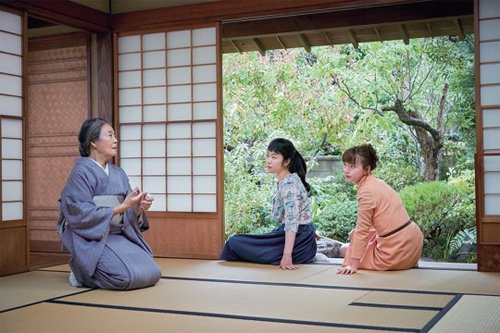Every Day a Good Day writer: Tea ceremony is 'refuge from life'
Every Day a Good Day writer: Tea ceremony is 'refuge from life'
Posted March. 13, 2019 07:40,
Updated March. 13, 2019 07:46

Those who watched the movie “Every Day a Good Day,” released in January this year, say it is a “must-watch” film. The movie is based on a collection of essays by Japanese writer Noriko Morishita. The writer talks about studying her life through tea ceremony, which she first learned at the age of 20. Although the book was released in Japan 17 years ago, it is still being loved by many. The Dong-A Ilbo had an e-mail interview with Morishita.
ㅡ I heard that tea ceremony is very difficult. What kind of attitude do we need to consistently learn tea ceremony?
“My teacher told me, ‘You need to keep your heart away in times like that.’ Just let the time fly even when you feel like quitting it. Then you’ll know if you really want to quit learning it or not.”
ㅡ The process of preparing tea ceremony and having a conversation about tea cups and a scroll felt like a discussion on art.
“Tea ceremony is art, philosophy, and the aesthetics of life. It is the time when you face yourself and taste seasons. It is also a way of treating others. I’d say tea ceremony is a ‘little refuge’ from the secular world.”
ㅡThere are lots of “wagashi” (traditional Japanese sweets) in the book. Are there specific wagashis that go well with specific teas?
“Wagashi is a traditional art, where you express seasons with different designs. Let’s suppose you make a cherry blossom wagashi. You can express a cherry blossom that has just started blooming, one that has started to fall slowly, or their petals flowing down a river.
ㅡHow did you feel after watching the film?
“The director and staff took tea ceremony classes for months before the shooting. I think the film delivered the process of understanding tea ceremony really well. By the way, you can find a celadon teacup I bought at an underground passage in Seoul 20 years ago in the film.
ㅡWhy do you think “Every Day a Good Day” and the film are being loved in Korea?
“We tend to neglect our five senses living in this world, where speed and efficiency matter the most. In a teahouse, you will be able to recover your senses as a life. The sounds of hot and cold water are different. Maybe people, who love my book and the film, unconsciously wish to become genuinely happy.
ㅡ I think tea ceremony is in line with meditation, which is gaining popularity these days, in that they are both about emptying your mind.
“You will experience extremely pleasant feelings from time to time if you forget worldly thoughts and concentrate on a good cup of tea. I think that is ‘emptying your mind.’”
Seol Lee snow@donga.com







